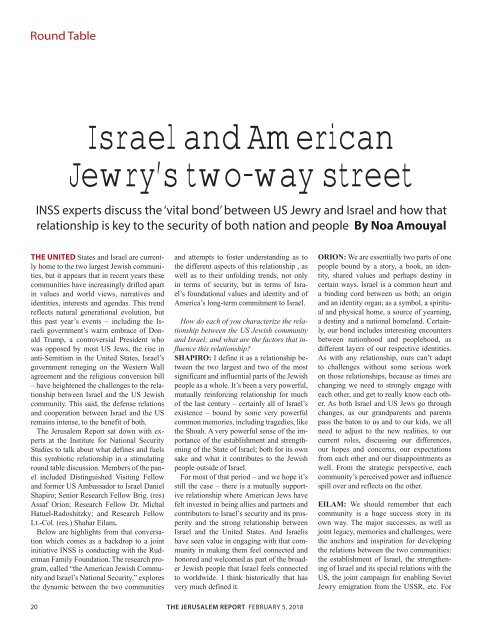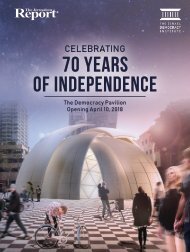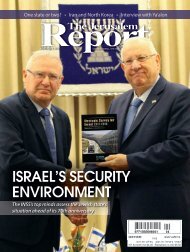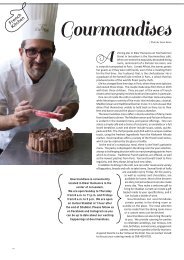All small
You also want an ePaper? Increase the reach of your titles
YUMPU automatically turns print PDFs into web optimized ePapers that Google loves.
Round Table<br />
Israel and American<br />
Jewry’s two-way street<br />
INSS experts discuss the ‘vital bond’ between US Jewry and Israel and how that<br />
relationship is key to the security of both nation and people By Noa Amouyal<br />
THE UNITED States and Israel are currently<br />
home to the two largest Jewish communities,<br />
but it appears that in recent years these<br />
communities have increasingly drifted apart<br />
in values and world views, narratives and<br />
identities, interests and agendas. This trend<br />
reflects natural generational evolution, but<br />
this past year’s events – including the Israeli<br />
government’s warm embrace of Donald<br />
Trump, a controversial President who<br />
was opposed by most US Jews, the rise in<br />
anti-Semitism in the United States, Israel’s<br />
government reneging on the Western Wall<br />
agreement and the religious conversion bill<br />
– have heightened the challenges to the relationship<br />
between Israel and the US Jewish<br />
community. This said, the defense relations<br />
and cooperation between Israel and the US<br />
remains intense, to the benefit of both.<br />
The Jerusalem Report sat down with experts<br />
at the Institute for National Security<br />
Studies to talk about what defines and fuels<br />
this symbiotic relationship in a stimulating<br />
round table discussion. Members of the panel<br />
included Distinguished Visiting Fellow<br />
and former US Ambassador to Israel Daniel<br />
Shapiro; Senior Research Fellow Brig. (res)<br />
Assaf Orion; Research Fellow Dr. Michal<br />
Hatuel-Radoshitzky; and Research Fellow<br />
Lt.-Col. (res.) Shahar Eilam.<br />
Below are highlights from that conversation<br />
which comes as a backdrop to a joint<br />
initiative INSS is conducting with the Ruderman<br />
Family Foundation. The research program,<br />
called “the American Jewish Community<br />
and Israel’s National Security,” explores<br />
the dynamic between the two communities<br />
and attempts to foster understanding as to<br />
the different aspects of this relationship , as<br />
well as to their unfolding trends, not only<br />
in terms of security, but in terms of Israel’s<br />
foundational values and identity and of<br />
America’s long-term commitment to Israel.<br />
How do each of you characterize the relationship<br />
between the US Jewish community<br />
and Israel; and what are the factors that influence<br />
this relationship?<br />
SHAPIRO: I define it as a relationship between<br />
the two largest and two of the most<br />
significant and influential parts of the Jewish<br />
people as a whole. It’s been a very powerful,<br />
mutually reinforcing relationship for much<br />
of the last century – certainly all of Israel’s<br />
existence – bound by some very powerful<br />
common memories, including tragedies, like<br />
the Shoah. A very powerful sense of the importance<br />
of the establishment and strengthening<br />
of the State of Israel; both for its own<br />
sake and what it contributes to the Jewish<br />
people outside of Israel.<br />
For most of that period – and we hope it’s<br />
still the case – there is a mutually supportive<br />
relationship where American Jews have<br />
felt invested in being allies and partners and<br />
contributors to Israel’s security and its prosperity<br />
and the strong relationship between<br />
Israel and the United States. And Israelis<br />
have seen value in engaging with that community<br />
in making them feel connected and<br />
honored and welcomed as part of the broader<br />
Jewish people that Israel feels connected<br />
to worldwide. I think historically that has<br />
very much defined it.<br />
ORION: We are essentially two parts of one<br />
people bound by a story, a book, an identity,<br />
shared values and perhaps destiny in<br />
certain ways. Israel is a common heart and<br />
a binding cord between us both; an origin<br />
and an identity organ; as a symbol, a spiritual<br />
and physical home, a source of yearning,<br />
a destiny and a national homeland. Certainly,<br />
our bond includes interesting encounters<br />
between nationhood and peoplehood, as<br />
different layers of our respective identities.<br />
As with any relationship, ours can’t adapt<br />
to challenges without some serious work<br />
on those relationships, because as times are<br />
changing we need to strongly engage with<br />
each other, and get to really know each other.<br />
As both Israel and US Jews go through<br />
changes, as our grandparents and parents<br />
pass the baton to us and to our kids, we all<br />
need to adjust to the new realities, to our<br />
current roles, discussing our differences,<br />
our hopes and concerns, our expectations<br />
from each other and our disappointments as<br />
well. From the strategic perspective, each<br />
community’s perceived power and influence<br />
spill over and reflects on the other.<br />
EILAM: We should remember that each<br />
community is a huge success story in its<br />
own way. The major successes, as well as<br />
joint legacy, memories and challenges, were<br />
the anchors and inspiration for developing<br />
the relations between the two communities:<br />
the establishment of Israel, the strengthening<br />
of Israel and its special relations with the<br />
US, the joint campaign for enabling Soviet<br />
Jewry emigration from the USSR, etc. For<br />
20<br />
THE JERUSALEM REPORT FEBRUARY 5, 2018
















